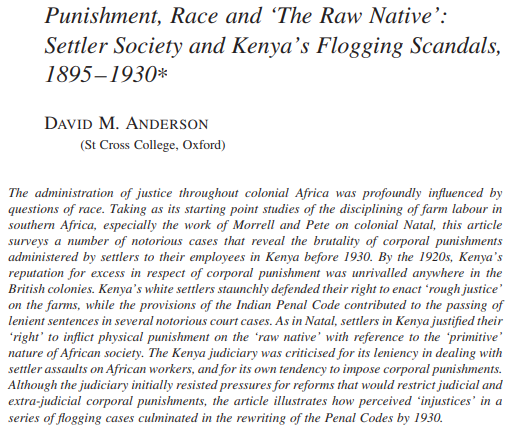
Sad that many Kenyans do not seem to realize the colonial origins of the "discipline" fetish.
https://twitter.com/WanjikuRevolt/status/1388588809948893189
"The African needed to be flogged ‘like a child’ to inculcate discipline, yet once ‘trousered’ he had taken an important step towards the world of the white man and might be treated with greater respect".
tandfonline.com/doi/abs/10.108…
tandfonline.com/doi/abs/10.108…

The whole discourse of "discipline" was meant to infantilize the miro. Till today, brutalising Kenyans, whether it is enforcement of covid-19 restrictions or corporal punishment in schools, is always justified using the language of "discipline".
The really sad bit is miros have internalized the idea that lack of "discipline", not stupid government policies, is the reason for dirty streets and traffic jams and poor education and health services. The language of "discipline" is used to tell the victim (s)he is the problem.
Here is another recent example of the "discipline" talk. A legislator tasked with oversight and representation thinks the people are the problem. How different is this from odiero thinking?
https://twitter.com/SenMutula/status/1388429756518047746?s=20
"By the 1920s, Kenya’s reputation for excess in respect of corporal punishment was unrivalled anywhere in the British colonies". 

Under the guise of "discipline" Kenya was one of the most brutalized societies in the British Empire. People were regularly beaten, jailed, tortured and murdered in the name of "discipline". Then, after 1963, Kenyans were told to forget about it and today think they deserved it.
"Colonial rule worked by deploying the language of crime and deviance to categorize vast segments of the colonized... [and] presenting law as the place where stable and disciplined subjects are produced".
tandfonline.com/doi/abs/10.108…
tandfonline.com/doi/abs/10.108…

• • •
Missing some Tweet in this thread? You can try to
force a refresh




